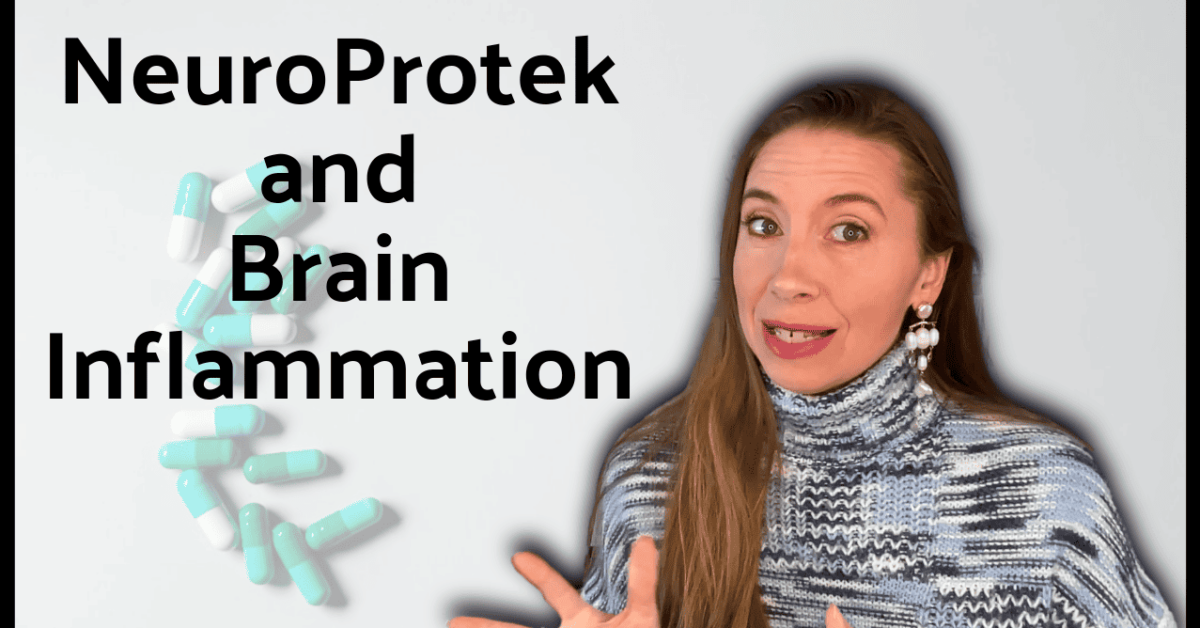Buying a lot of supplements?
Are they worth the time and effort?
Do they do anything?
Yes! And they need to be the right ones at the right time.
Can supplements for the brain actually work?
Is there any scientific evidence?
Let’s explore a supplement that supposedly targets brain inflammation.
Brain inflammation is a legitimate health concern for some with autism.
You can check out these two videos on CerebroSpinal Fluid and Autism and the 3-part series on Microglia and Autism. This is all important and cutting-edge information about the brain and autism.
So the question is:
Can supplements really help those with autism and brain inflammation?
Let’s start with the common supplement, Neuroprotek, and understand the science.
What is Neuroprotek?
NeuroProtek is a combination of three highly pure natural flavonoids:
- Luteolin
- Quercetin
- Rutin
These ingredients are added into a carrier oil, like olive oil, to maximize the effects of flavonoids and also to overcome any absorption obstacles. We want this to go to the brain, so it’s got to be absorbable.
Flavonoids are a group of molecules found in a variety of fruits and vegetables. They have potent antioxidant, anti-inflammatory, and neuroprotective properties. And this is what Neuroprotek claims.
The unique patented combination of flavonoids and olive pomace oil may help:
- reduce oxidative stress and inflammation,
- minimize mast cell activation-related symptoms,
- tolerate sensitive foods,
- protect against neuronal damage,
- increase attention, concentration, focus, and learning,
- decrease memory deficits.
Those are a whole variety of absolutely great things that, of course, we would want for our children if they’re having any problems in these areas.
The ingredients
- Luteolin comes from grapefruit seed, and it is the most abundant ingredient in Neuroprotek. And the reason why is because it is the most lipophilic (fat loving), and therefore has a higher probability of entering the brain.
- Quercetin is sourced from the Sophora japonica flower. Fava beans are not used because some people react to fava beans.
- Rutin is also derived from the Sophora japonica flower. This ingredient is specifically included to decrease intestinal inflammation, which may contribute to GI symptoms, and increase tolerance to sensitive foods.
- There are also some additives included.
Creation of NeuroProtek
There’s increasing evidence that oxidative stress, brain inflammation, GI dysfunction, and allergic symptoms may be present in autism patients.
According to this 2012 research publication, the flavonoid luteolin has antioxidant, anti-inflammatory, anti-allergy, and neuroprotective properties.
It’s very simple in how they constructed the NeuroProtek for the ingredient’s sake. Why they chose particular ingredients? It’s to target things like oxidative stress, brain inflammation, GI dysfunction, and allergic symptoms.
The research
The research studied 37 children with autism, ranging in age from 4 to 14 years old. These children hadn’t obtained any benefit from multiple other regimens and used this formulation for at least four months.
Neuroprotek is not something that has instant, quick, fast results. It’s meant for long-term use.
Results
“GI and allergy symptoms improved in about 75% of children.” Remember, these were children on whom other interventions did not work. So that is an impressive number considering that the parents had tried multiple other things and really didn’t see any benefit. And again, remember, this is 2012.
“Eye contact and attention increased in 50% of the subjects, social interaction increased in 25% of the children, and resumption of speech in about 10% of those 37 children studied. “
There were no adverse effects. That’s always important as a parent. You want to make sure what the potential risks are.
And this is the quote from the research article, “Even though these results represent an uncontrolled, open case series, they are encouraging because they suggest good tolerability and potential effectiveness.”
Based on this publication, different patents were taken out for NeuroProtek.
The researcher
The person who developed Neuroprotek is a very active scientist. He’s just about retiring at this point. He’s worked in autism and other therapeutic areas and is highly respected, with hundreds of publications to his name.
The next steps
The main takeaway from this is that yes there is science backing up NeuroProtek. Make sure that you manage your expectations when you’re thinking about Neuroprotek.
This supplement is typically given for six months at a minimum. It’s a soft gel that can be opened and put in a drink if your child doesn’t swallow pills.
You want to have a really great dialog and discussion with your functional medicine doctor to make sure NeuroProtek is appropriate for you or your child. You certainly wouldn’t want to waste six months giving something just to see if it works.
Reference
Int J Immunopathol Pharmacol. 2012 Apr-Jun; 25(2):317-23.



